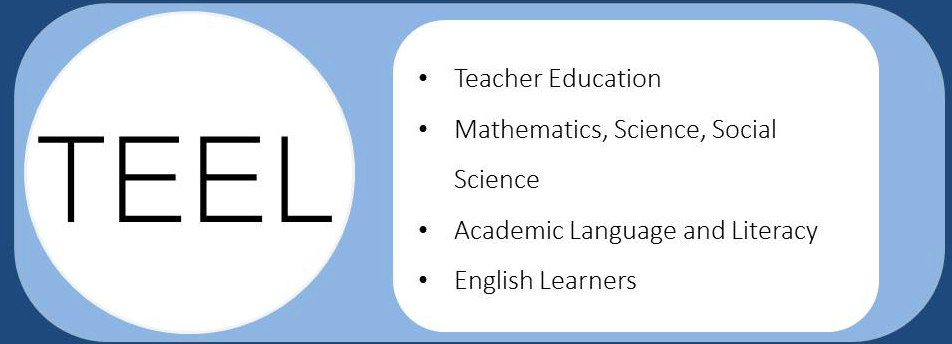The Teacher Education and English Learners (TEEL) research group has developed and validated an experimental model of teacher education to prepare K-12 teachers to more effectively teach STEM subjects to California and the nation’s rapidly growing population of English Language Learners (ELLs). With an NSF and USDOE funding base of $8 million for three funded projects -- ESTELL, ELLISA and SSTELLA – the TEEL group has developed a model that prepares pre-service and experienced teachers to integrate the teaching of academic language and literacy into the teaching of science and math and validated this model in pre-service teacher education programs at seven universities in California, Arizona, and Texas. The TEEL model is aligned with the implementation of the Common Core State Standards (CCSS), Next Generation Science Standards (NGSS), and California English Language Development (ELD) Standards.
Related video: Preparing Science Teachers to Support English Learners (SSTELLA) at the 2019 STEM-for-All Video Showcase sponsored by the NSF
A short video created in partnership with NSTA for the 2019 NSTA National Conference
TEEL Collaborators:
- University of California, Santa Cruz: Trish Stoddart, Doris Ash, George Bunch, Eduardo Mosqueda
- Sonoma State University: Edward Lyon
- San Francisco State University: Isabelle Quita
- San Jose State University: David Whitenack
- Santa Clara University: Marco Bravo
- University of Arizona: Sara Tolbert, Barry Roth, and Ivan Salinas
- University of Texas San Antonio: Jorge Solis and Kimberly Billica
- UCSC Graduate Student Researchers: Joe Chee, Joanna Couling, Rachel Fisher, Corey Knox, Saul Maldonado, Preetha Menon, Karmin San Martin and Maria Ugha
Principal Investigator: Professor Trish Stoddart, University of California, Santa Cruz, stoddart@ucsc.edu
In commemoration of the White House Initiative on Educational Excellence for Hispanics Initiative's 25th anniversary in 2015, the TEEL group was named one of 230 "Bright Spots in Hispanic Education," a program or organization recognized for helping close the achievement gap in education. For more information about the White House Initiative, go here. See a related UCOP news article.
The ESTELL and SSTELLA projects are supported by grants from the National Science Foundation. Any opinions, findings, conclusions and/or recommendations expressed herein are those of the principal investigators and do not necessarily reflect the views of the National Science Foundation. The English Language and Literacy Integration in Subject Areas (ELLISA) project is funded by the U.S. Department of Education Office of English Language Acquisition National Professional Development Program.
